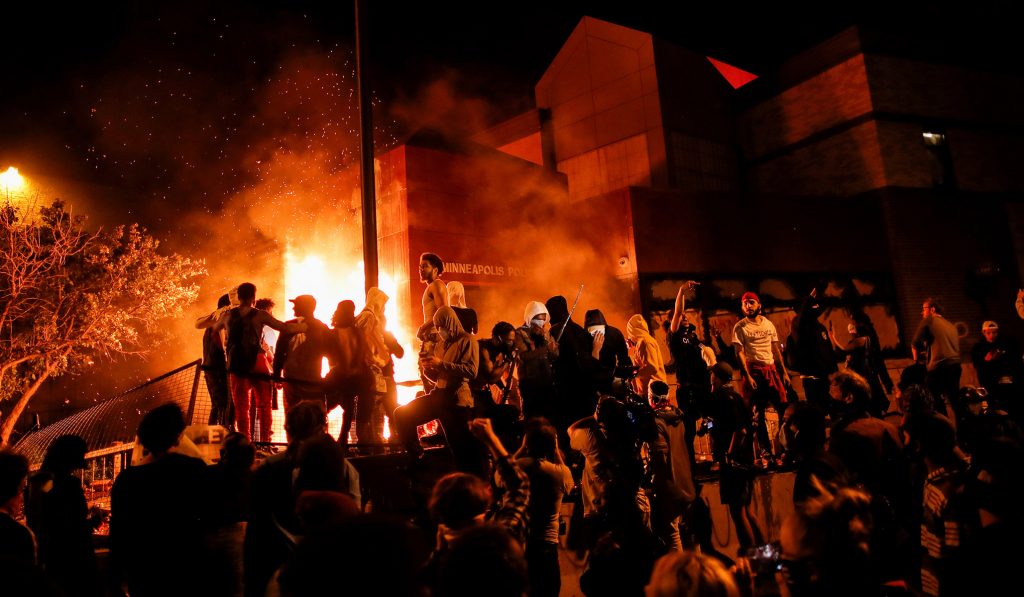
By Dave Workman | Editor-in-Chief
About the best thing anyone in the firearms community can say about 2020 is that it is almost over, provided it wasn’t a preview of what to expect in 2021, and even that’s not a certainty with continuing voter unrest over the outcome of the Nov. 3 presidential election and the balance of power on Capitol Hill hinging on the Jan. 5 Senate runoff elections in Georgia.
The year was off to a rocky start for gun rights as anti-gun Democrats took control of the Virginia legislature for the first time in two decades, immediately launching an attack on gun rights. Democrat Gov. Ralph Northam pushed his gun control agenda and his Democrat colleagues responded, despite a massive turnout of furious gun owners in Richmond in January. More than 22,000 citizens gathered for Lobby Day, the biggest state-level turnout of gun owners anywhere in recent memory.
Those same gun owners may be planning for some payback in November 2021, when legislative elections are held in the Old Dominion.
Also in January, Florida Carry, Inc., won a lawsuit against Broward County for violations of the state preemption statute which dates back to 1987.
In February, as legislatures across the country gathered to discuss further gun rights restrictions, the Trump White House announced an ambitious school safety effort which drew immediate support from the Citizens Committee for the Right to Keep and Bear Arms. The group noted in a news release that the effort focuses on actual school security without proposing restrictions on law-abiding firearms owners.”
Anti-gunners moved quickly to exploit a mass shooting at the Molson Coors Brewery in Milwaukee, pushing legislation to ban so-called “high-capacity magazines” in the state.
March saw attorneys representing several major gun rights organizations in a federal civil rights lawsuit in California revise their complaint related to the COVID-19 shutdown in California. It would be the first of several legal actions SAF and various partner groups launched as a result of local political actions that closed gun shops and ranges or suspended taking applications for, and issuing, new concealed carry permits and licenses.
One of those cases involved officials in Wake County, NC, where officials confirmed in writing they would revise policies and enforcement rules to allow the continued operation of gun stores during the ongoing COVID-19 panic, thus heading off a threatened legal action. Sometimes, all SAF needs to do is threaten legal action and things smooth out.
Pandemic Panic
But as early as March, the effect of the COVID-19 pandemic panic began being felt. TGM reported the first signs of a rush on guns and ammunition across the American landscape. It caused what was described at the time as an “historic spike” in the number of initiated background checks. By the end of the year, an estimated 7.5 million citizens had purchased guns for the first time in their lives, and their ammunition purchases—along with buying by established gun owners—resulted in an ammunition shortage that continues today, while ammunition manufacturers are working 24/7 to fill the demand.
The National Rifle Association cancelled its 149th annual meetings and exhibits due to the pandemic. That was a double blow to Nashville, which had been recently hit by a devastating tornado. The millions of dollars an NRA convention would have brought to the community would have helped the city recover. An annual meeting was finally convened, as required by the bylaws, but it was a brief affair.
At a rally in Texas, then-candidate Joe Biden outraged American gun owners—as if he might have cared—when he brought ex-Congressman Robert Francis “Beto” O’Rourke to the stage to declare the anti-gun Texan would be his point man on gun issues.
Not long afterwards, while touring an auto factory in Detroit, Biden engaged in an expletive-laced conversation with factory worker Jerry Wayne, telling the hardhat he was “Full of s—t” for challenging the former vice president about his intention to ban guns. Biden denied having said it, but fact-checking quickly showed he was either forgetful or lying.
April arrived with the nation still essentially in lockdown, as politicians who had initially said the pandemic restrictions would only last for two weeks. Gun rights groups moved swiftly to make their point that gun shops and ranges were “essential” business operations. A quartet of gun rights organizations including the National Rifle Association, Second Amendment Foundation, Firearms Policy Coalition and New Mexico Shooting Sports Association filed a federal lawsuit Friday against New Mexico Gov. Michelle Lujan Grisham, challenging her closure of gun stores during the COVID-19 crisis.
The complaint was filed in U.S. District Court for the District of New Mexico and is known as Aragon v. Grisham.
That wasn’t the only legal action. A coalition of Second Amendment organizations filed a federal complaint against Massachusetts Gov. Charlie Baker in U.S. District Court, alleging the governor overstepped his authority by ordering gun shops closed in the Commonwealth during the coronavirus pandemic.
Canada Tragedy
Anti-gunners looking for something to divert public attention found the perfect example in a mass shooting in Nova Scotia. The weekend rampage left 22 people dead, including one RCMP Constable, but then the gun control arguments started falling apart when it was revealed the killer was driving an apparently decommissioned RCMP cruiser and was wearing a facsimile of a Mountie uniform. He had also illegally possessed the firearms he used, including a sidearm he took from the body of slain Mountie Heidi Stevenson, who he shot at close range. The following month, Canadian Prime Minister Justin Trudeau announced a ban on so-called “military-grade assault weapons” in reaction to the murder rampage.
At the time, CCRKBA Chairman Alan Gottlieb noted in a prepared statement, “We do not believe adding more restrictions on gun ownership for law-abiding Canadian citizens will to anything to prevent such tragedies in the future.”

Back in California, a federal judge declared the state’s background check requirement for ammunition purchases violates the U.S. Constitution. However, the Ninth Circuit Court of Appeals granted a stay pending an appeal.
Down in Florida, State Attorney General Ashley Moody sent a letter to Agriculture Commissioner Nikki Fried, warning her against delaying the processing of concealed weapon and firearm license applications, to avoid a lawsuit similar to three filed in neighboring Georgia, including one by SAF and the Firearms Policy Coalition.
Spring was in full bloom when in May a federal judge said Massachusetts gun stores could stay open for business, resulting in a defeat for Gov. Baker’s anti-gun sentiments.
That same month, officials in New Zealand, where stricter gun laws were enacted following shootings at two mosques last year, had to acknowledge crime had spiked upwards.
Late May brought the incident in Minneapolis that sparked a summer of urban unrest, rioting and some death. A black man named George Floyd died after being restrained by a police officer; an incident caught on video and transmitted across social media. Violence erupted in that city, and in Portland, Seattle, and several other cities. What began as peaceful protest marches in several places quickly descended into chaos as anarchists including Antifa thugs turned many situations into riots, with looting, property destruction, arson and assault.
When demonstrators seized control of a six-block area in Seattle dubbed the “CHOP Zone” in June, there were two murders about a week apart. One man was gunned down in Portland, and the suspect was killed a few days later by lawmen in Washington state.
The social unrest added more fuel to gun and ammunition sales.
Losing an Icon
June also saw the passing of an icon in the firearms community, and it was a personal loss for TGM and the Second Amendment Foundation.

Joe Tartaro, described by many as a walking encyclopedia of the firearms rights movement died June 13 following a brief bout with cancer. He was 89.
Mr. Tartaro had served not only as executive editor of GUN WEEK and its successor, TGM, he was also SAF president for many years, and a living wealth of knowledge about the gun rights battles going all the way back to the famed Revolt at Cincinnati that changed the direction of the NRA and turned it into a political powerhouse in defense of the Second Amendment.
Tartaro was one of those rare people who knew and was known by everybody in the firearms industry. His annual presentations on the history of the gun rights movement during the annual Gun Rights Policy Conference was a perennial crowd-pleaser. As an editor, he was meticulous with an attention to detail, and his Hindsight column was often the first thing read in each issue of GUN WEEK and in the print edition of TGM, which has now gone completely online.
That same month, the U.S. Supreme Court once again declined for review any Second Amendment cases—there were ten on the table—but that may change in 2021 following the passing of liberal Justice Ruth Bader Ginsberg, who was replaced by conservative Amy Coney Barrett.
At the time, SAF declared Chief Justice John Roberts “owes every gun owner in the United States an explanation about why the high court declined to hear a number of important Second Amendment cases.”
But now the high court has a clear conservative majority, and gun rights groups are hopeful that cases now winding their way up through the courts will ultimately be heard by the justices, resulting in restoration of lost ground for Second Amendment rights.
Also in June, SAF announced a new effort to remind America that the right to keep and bear arms is all-inclusive, and that all citizens regardless of race, creed or color should never be denied the exercise of their constitutionally-protected rights. It was headlined the Gun Rights Equality Project, aimed squarely at minority gun owners.
Days after the second of two homicides in Seattle’s CHOP Zone, police moved in and cleared protesters out, re-occupying their East Precinct offices and bringing back some semblance of order. Leaders of the occupation movement released a statement urging their “comrades” to “go home and vote for Biden.”
‘Defund Police’ Movement
One political effort that emerged from the George Floyd controversy was a campaign to defund police departments. It started in and picked up momentum in July.
Two national surveys, conducted independently from one another and released on the same day, show a majority of Americans think efforts to reduce police funding will result in a disaster producing more violent crime. The majority was right, as homicides in several cities have picked up dramatically, along with violent crime. Murders in Seattle doubled from 2019, and Chicago will finish the year with nearly 800 slayings.
Again, it has led to even more gun and ammunition sales, and some police agencies have lost many officers who have moved to agencies in more supportive jurisdictions.

One result was CCRKBA’s suggestion that people in Minneapolis, Seattle and elsewhere “arm up” because it was becoming a concern that police agencies would be unable to respond to emergencies, such as home invasion robberies.
SAF and the Illinois State Rifle Association filed a lawsuit in federal court in July seeking to force the Illinois State Police (ISP) to comply with the mandated 30-day requirement to issue a Firearm Owner’s Identification (FOID) Card if the applicant meets all qualifications. They alleged the Illinois State Police has been dragging its feet on approving FOID card applications.
The lawsuit is known as Bradley v. Kelly.
That same month, CCRKBA has launched a campaign called “Don’t Feed the Gun Prohibitionists.” It’s an effort to steer gun-owning consumers away from businesses and brand names that support efforts to erode their Second Amendment rights. Right now, the names and CEOs of nearly 200 American businesses are listed on the CCRKBA website.
As it first appeared on the committee’s website, nearly 180 companies are listed, along with the names of their CEOs, above this message: “Don’t Have Buyer’s Remorse! Make the decision with your wallet to fight against firearm prohibition.”
July 27 was a sad day for fans of “Gunblast” as host Jeff Quinn passed away. An icon in the field of firearms communication, Quinn started Gunblast in 2000 with his brothers, Boge and Greg.
Remington filed for Chapter 11 bankruptcy protection. It had been just over two years since the company had filed an earlier motion. The company components have been up for sale.
The Gun Owner’s Action League of Massachusetts filed a federal lawsuit on behalf of Lowell resident Thayer Eastman against Police Supt. Raymond K. Richardson, in his official capacity, for “failure to process firearms licenses in a timely fashion.” It’s a case that could have far-reaching ramifications because of similar situations in other jurisdictions relating to how local issuing authorities are reacting to the continuing coronavirus situation.
NRA Sued
In August, the NRA was hit with two civil lawsuits in separate jurisdictions, one seeking to dissolve the organization and the other an effort to impose new governance policies on the NRA Foundation. Many believe the timing was designed to weaken the organization in the middle of a critical presidential and congressional campaign.
New York Attorney General Letitia James filed a civil lawsuit in New York Supreme Court, seeking to dissolve the 144-year-old organization, founded in 1871 and incorporated in New York State.

NRA almost immediately counter-sued, according to Fox News. In that lawsuit, NRA asserts, “The New York Democratic Party seeks to harass, defund and dismantle the NRA because of what it believes and what it says. Only this Court can stop it.” Recently, attorneys general from more than 15 states filed an amicus brief in the case, supporting the NRA and accusing James of playing politics.
President Trump signed the Great American Outdoors Act into law. This bipartisan legislation will improve our public lands, stabilize funding for the Land and Water Conservation Fund (LWCF) and provide economic relief to help kick start the economy, according to a news release from Ducks Unlimited.
U.S. District Judge Ronald Leighton in Tacoma told both sides in a lawsuit challenging provisions of gun control Initiative 1639, “I don’t share the hyperbole about the evil of guns or the sanctity of the right to self-defense,” before indicating he would rule on competing motions by the end of August. He dismissed the case and gun rights groups almost immediately filed an appeal to the Ninth Circuit Court in San Francisco.
A three- judge panel of the same appeals court ruled 2-1 that California’s ban on so-called “large capacity magazines” violates the Second Amendment. It was a victory for the California Rifle & Pistol Association, and gun rights advocates across the West.
Mail-In Voting Trouble Begins
With national elections less than two months away, President Trump and other Republicans began raising alarms in September about potential election problems, including fraud, with arguments on both sides creating headlines, but an alarming and apparently not-so-unusual mail delivery situation at a leading run rights group’s national headquarters illustrated why concerns about the election might have been valid.
Mail originally destined for several different addresses—in different states, even—was showing up at the SAF offices in Bellevue, Wash. Indeed, the problem still exists, underscoring concerns about mail delivery and how it might affect the election.
September’s annual Gun Rights Policy Conference was held completely online this year, with an audience reaching a new record. The success was so convincing that doing the conference online in the future may be a strong consideration by SAF and CCRKBA, co-sponsors of the event.
The decision to hold the conference online was due to the COVID-19 pandemic.

With the confirmation of Amy Coney Barrett to the Supreme Court, Democrats were furious and panicking at the same time. They started threatening to pack the court after Biden won the November election, and the threat still remains.
SAF launched the “2A First Responder” campaign earlier in the year and in September, the group expanded its advertising for the effort on several television channels.
October rumbled in with the campaign season in high gear, yet Biden remained largely confined to his basement while Trump continued to draw huge crowds to rallies after his bout with the coronavirus that took him off the campaign trail.
And politics took on a particularly alarming complexion with accusations, and some acknowledgement of social media bias targeting conservatives. The popular Greybar Hotel was disabled by Facebook, as was the Conservative Firing Line’s Facebook page. At CFL, there is this message: “Your Page Has Been Unpublished. This is because Conservative Firing Line goes against our Community Standards on spam.”
It was reported that anti-gun billionaire Michael Bloomberg was spending a fortune in an effort to get Democrats elected in Florida. The figure would hit a reported $100 million, and Republicans won.
The Wall Street Journal reported that the IRS was investigating NRA CEO Wayne LaPierre “for possible criminal tax fraud related to his personal taxes, according to people familiar with the matter.” Once again, this news and the investigation, itself, were seen by many gun rights advocates as deliberately timed in an effort to weaken the NRA at a moment in political history that it needed to be in the game.
Victory for SAF-NRA Lawsuit
After the City of Seattle adopted a “safe storage” mandate in violation of Washington State’s long-standing state firearms preemption law in 2018, SAF and the NRA took the city to court. A similar requirement was adopted in Edmonds, several miles north and in a different county.
Edmonds lost at the trial court level, while in Seattle, a judge tossed the suit on a “standing” technicality. SAF and NRA appealed and in October, the State Court of Appeals panel ruled unanimously to reverse and remanded the case back to the lower court after ruling the plaintiffs do have standing.
The Crime Prevention Research Center released its annual update on the number of concealed carry license holders. The new estimate is 19.48 million, and that was on the light side due to the number of people who could not obtain a license because the application process has been suspended in many jurisdictions.
And then came the national elections, and the results are still in dispute with allegations of vote fraud in several states, although courts have dismissed several lawsuits challenging election results in those states. Biden was declared the winner, and promises of surprise reversals never materialized. Two Jan. 5 runoff elections for U.S. Senate seats, both in Georgia, will determine the Senate majority, which may be the only hope gun owners have of preventing massive attacks on Second Amendment rights under Biden and Kamala Harris.

Democrats lost several seats in the House when they expected picking up more, and many of those losses went to conservative pro-gun Republican women.
Also in November, SAF and the FPC filed suit in Pennsylvania alleging discrimination against young adults by prohibiting them from carrying firearms for self-defense because they cannot acquire state carry licenses until they are 21.
SAF and FPC also filed a lawsuit in Louisiana, joined by the Louisiana Shooting Association, essentially on similar grounds, this time dealing with the inability of young adults to purchase handguns, even though the law considers them legally able to join the military, vote in national elections, get married, own homes and start businesses.
A third lawsuit was filed in New Jersey, challenging that state’s restrictive requirements to obtain a concealed carry license. SAF and FPC are joined by the New Jersey Second Amendment Society and two private citizens.
Also in November, SAF was joined by the popular Polite Society Podcast, which is now a SAF project. Founder Paul Lathrop has joined the SAF team as a contributing editor to TGM, and also as Deputy Director of New Media.
Wrapping it Up
If Jan. 1, 2021 provides America with anything positive, it will be literally the first time in history the nation can enjoy “2020 Hindsight.” Seeing the year in the rearview mirror is what many people have been waiting for.
In Texas, legislation has been announced that will require citizens to “safely retreat” before using force against another person, a modification of the state’s “castle doctrine” that could prove deadlier than the alleged problem it is supposed to correct. The legislation is sponsored by State Rep. Terry Meza.
The biggest news of the month has been the swiftness with which the ATF proposed and then withdrew proposed changes in the regulation of “stabilizing braces” on tens of thousands of AR15-type pistols. The initial notice was published Dec. 18, and withdrawn five days later, providing gun owners with a nice Christmas present.
But the year is going out on a down beat, with several major cities reporting alarming spikes in homicide. Philadelphia is creeping toward 500 slayings. Chicago is approaching 800. Seattle has had at least 55 murders. New York has almost 450 killings. Miami has more than 60 homicides.
Is it due at least in part to the pandemic and loss of jobs, economic pressure and for many virtual confinement? This will require considerable analysis, which will likely involve some uncomfortable acknowledgement by various officials that their policies may also be partly at fault.
About the best that can be said by anyone waking up Friday, Jan. 1 is that they made it through 2020, and one can almost envision the sales boom of T-shirts bearing the message “I Survived 2020” or “Thank God for 2020 Hindsight.”



